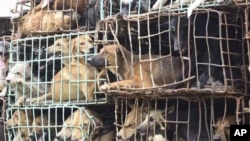Whether served up with a side of shrimp sauce or tucked under the arm of a teenage girl, dogs are hugely popular in Vietnam.
As the country’s economy grows and people become wealthier, the trade in dogs - and dog meat - is booming. Although an increasing number of people are purchasing expensive pedigree breeds to keep as pets, the trend hasn't diminished the national appetite for canine cuisine.
Although consumption of dog meat is against the law in most of Asia, in Vietnam it's not only legal but routine. Usually raised in rural villages, the dogs are then sold to intermediaries who transport them to restaurants in the cities.
According to Tuan Bendixsen, director of the Vietnam office of Animals Asia, as more people move to the cities, fewer remain in the countryside to raise the dogs, which creates enough scarcity to drive prices up. But increased wages mean more people can afford to eat dog, he says, which creates a parallel increase in demand.
"The problem is that there isn't enough to feed the trade, especially around Vietnamese New Year, which means dogs are going to be imported from Thailand," says Tuan. "There was an estimated 25,000 or more dogs coming in per month from Thailand."
Last month Thai police caught three men trying to smuggle more than 1,000 dogs into Vietnam from Laos.
"If you go to central Vietnam near the Laos border, you often see huge trucks coming across with at least 200 to 300 dogs stacked in cages like chickens," he says. "Each cage - and they are very small cages - with about 10 dogs. That’s to feed Vietnam's dog-meat industry."
A lack of government oversight
"Dog has a particular flavor [I] like," says a translator on behalf of Nguyen Trung Thanh, 41, a regular at a Hanoi restaurant that serves dog. He says the establishment is not only popular among friends, but that its canine dishes are flavorful, nutritious delicacies that are good for building strength.
But dog meat is not always associated with good health. In 2008, there was a call for dog-meat trade regulations after a severe outbreak of cholera was linked to eateries that serve dog.
Although farm animals like cattle, pigs and chickens are regulated by Vietnam's Ministry of Agriculture and Rural Development, there is no legislation on the dog industry. Some animal advocates say government unwillingness to curb the market is actually a good thing.
"We thought that would set a very bad precedent for the dog trade in general," says Tuan, explaining that Animals Asia opposed a 2009 effort by South Vietnamese provincial authorities to enforce regulatory measures. "We thought if this happened it would open doors for the dog-meat trade in [our country]. Vietnam should not be the first nation to enact regulation allowing the dog-meat trade."
Tuan also says most dog-meat fans are predominantly middle aged, and that younger Vietnamese are more likely to keep dogs as pets because they identify with Western societies.
A general ambivalence
Thanh Quoc Bao, senior manager at the Vietnam Kennel Association, says that although there are few pedigree breeders based in Vietnam, the range of breeds available for purchase has expanded dramatically over the last decade. The kennel association has helped formalize breeding for local pedigrees like the Phu Quoc ridgeback, which featured in the World Dog Show in Paris for the first time in July.
Of all the imported breeds, he says the most popular by far is the German shepherd, which, fully grown, can fetch as much as $1,000 on the open market - 10 times the average monthly wage.
A self-professed dog lover, Bao says he refuses to eat dog and thinks all breeders should refrain from the practice.
Twenty-seven-year-old Trinh Anh Ngoc, a company security guard in Hanoi, feels differently. Nine months ago he spent $500, the equivalent of three months wages, on a German shepherd puppy.
Although he intends to use the animal as a guard dog and describes it as a friend that he would never eat, he has no qualms about dining on other dogs.
"Vietnamese dogs are less intelligent than Western dogs and the meat is leaner," says a translator on his behalf, explaining that Ngoc regularly orders dog when it is on the menu.
Tuan says this ambivalence toward ownership and consumption is the norm in Vietnam.
"I have spoken to quite a few people who regularly eat dog meat and they love their dogs," he says. "I know one girl who has a little Chihuahua [that] she carries around in a basket, but she regularly eats dog meat. I ask her why ... and she tells me she likes the taste. To me there’s a missing connection somewhere. What they see in their dog and what they see on the plate."
Even if more Vietnamese adopt dogs as companions, he says, getting a leash on the trade is a difficult task, and it is doubtful dogs will disappear from menus any time soon.
